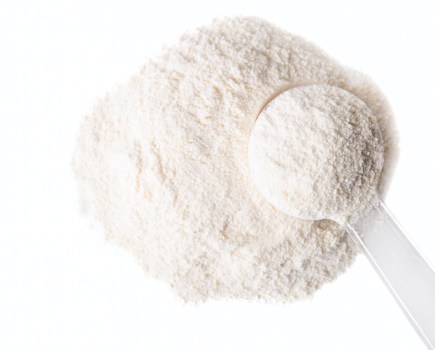While most of us understand the role pre-workouts play in our fitness routines, the conventional wisdom that there’s a hard limit on the amount of protein your body can absorb in one sitting has taken a significant hit from a new study that has multiple nutrition experts reevaluating the picture of post-workout nutrition. But what does this mean for your own performance diet?
Most people stepping into a gym in 2024 to add muscle will have heard the advice that there’s an upper limit to the amount of protein your body can absorb in one sitting (usually around 30-40g). But a study published in Cell Reports Medicine in December 2023 appears to have sunk that rule by showing that a 100g ‘protein bomb’ consumed after a heavy workout resulted in a greater and more prolonged anabolic, muscle-building response (more than 12 hours) when compared to the standard 25g of protein found in most protein powders.

The study’s authors used isotope amino acid tracers within their post-workout ‘protein bombs’ to track how they were absorbed into new muscle protein, through muscle protein synthesis. This created a new understanding that the size and duration of the muscle-building response to consuming protein is not restricted, and has previously been underestimated in humans. It’s the first time such a large intake of post-workout protein has been studied, and this technique used.
This is why the study’s TDLR for specifically post-workout protein consumption is: engage feast mode! And the nutrition experts we spoke to are impressed. “This study challenges the traditional view of protein absorption, suggesting that consuming significantly higher amounts of protein post-workout may be beneficial for muscle recovery and growth,” says Jacek Szymanowski, PN Certified Nutritionist and Health Coach.
Protein spread or protein bomb?
It does sound like the usual advice to spread protein out evenly through the day, with a rough limit of 20g/25g max per meal, is suddenly outdated. So can you just dump enough of your favourite protein powder for 100g into a shaker, slam the lot and then just have a couple of bars and shakes for the rest of the day? No, absolutely not, says Jess Hillard, Sports Nutritionist at Warrior. “Protein bars and shakes are very convenient and can be used on a daily basis to help get a protein fix, but you cannot rely solely on these protein snacks.”
Whole food is always better as the body utilises it more efficiently. Basing meals with high-protein whole food sources and using bars and shakes to top up snacks if you cannot use whole foods, is the best way to do it.”
This is sound advice for a sustainable nutrition plan, and using protein shakes may be inescapable unless you smash a barbecue after every workout, because as Jess Hillard points out, 100g of protein does actually look like a lot. It’s roughly: one whey protein shake with semi-skimmed milk (17g), protein bar (20g), 2 boiled eggs (15g), cooked chicken breast (56g). For context, the reference daily requirement for protein is 0.75g per kilo of bodyweight, but athletes and lifters using exercise to break down and rebuild muscle require additional protein to fuel this process (generally agreed to be 1.5-2g).
Of course, as Jacek Szymanowski stresses, there’s a large degree of individual variance in dietary requirements and exercise response. The first thing to say is that if your workout doesn’t have the intensity to generate a response then muscle protein synthesis can’t be ramped up by additional protein, and Szymanowski does see potential downsides to more protein than you need: “Excessive protein consumption beyond an individual’s requirements can lead to unnecessary calorie intake and potential strain on the kidneys.”
Protein-bomb post-workout
As ever, working with an exercise and nutrition professional, and reading the latest in Men’s Fitness, will equip you to find your personal best balance of training, food and rest, but trying a ‘protein bomb’ after intense workouts does look like a good call: “Increasing protein intake after workouts may support enhanced recovery, muscle repair, and overall performance for athletes and those engaged in intense training,” says Szymanowski, who is backed up by Hillard: “I will be taking this away these findings and recommending that athletes have a high protein intake in the first 60 minutes of finishing training.”
If you’re wondering how nutritional advice can be so thoroughly overturned, the ‘upper limit’ for protein intake was always pretty vague and the subject definitely needed further research. “Other studies in the past have had some limitations to them when looking at spreading protein evenly throughout the day and muscle protein synthesis – this study is pretty solid and has clear evidence from findings,” says Hillard.
Personally, I know I won’t be trying to consume 100g of protein immediately after every good workout, but I will up protein intake after my intense and heavy weights sessions to see how my body reacts, over time. I’ll probably also mix up my protein intake through the day rather than stressing about eating exactly 20-25g with each meal. And I’ll feel freer to engage ‘feast mode’ at my next post-workout BBQ, too!







